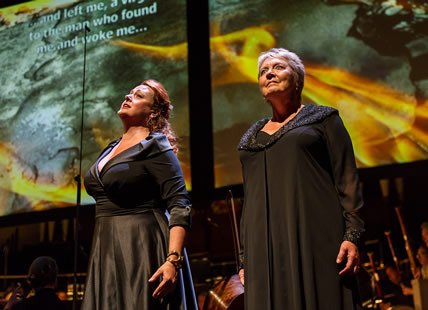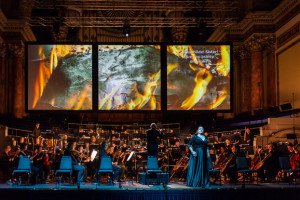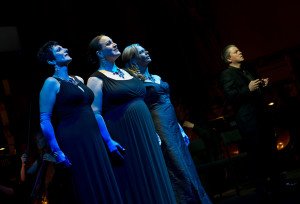 What is all the fuss about? Well, I have come across the argument, a cogent one, to the effect that Der Ring Des Niebelungen is the greatest artistic achievement by a single individual in the entire history of human civilisation. A ludicrous, outlandish claim, you may think, but consider the epic proportions of its conception and Wagner’s singular perseverance during its two-decade gestation. Take into account the required scholarly revival of the ancient Niebelung saga and the adaptation of its medieval world play as a vehicle for expressing contemporary revolutionary thought. Ponder on his devising a moralistic plot charting love’s and the human spirit’s triumph over not only the potentates of temporal power, but those beings of godly authority and diktat. Remember that he had then to incorporate this into the construction of a performable libretto.
What is all the fuss about? Well, I have come across the argument, a cogent one, to the effect that Der Ring Des Niebelungen is the greatest artistic achievement by a single individual in the entire history of human civilisation. A ludicrous, outlandish claim, you may think, but consider the epic proportions of its conception and Wagner’s singular perseverance during its two-decade gestation. Take into account the required scholarly revival of the ancient Niebelung saga and the adaptation of its medieval world play as a vehicle for expressing contemporary revolutionary thought. Ponder on his devising a moralistic plot charting love’s and the human spirit’s triumph over not only the potentates of temporal power, but those beings of godly authority and diktat. Remember that he had then to incorporate this into the construction of a performable libretto.
Next, factor in the masterly composition of over fourteen hours of the most complex, exhilarating and inspired romantic music, destined to influence other composers’ thinking for decades thereafter. Recognise his consummate writing for an enormous orchestra, scaled to include seven harps and eighteen anvils, for which he found it necessary to invent new additional instruments, the Wagner tubas, which filled a perceived tonal gap between french horns and trombones. For existing bassoons, he developed the Wagner bell, a device to lower the bottom note crucially down to A natural. Remind yourself that it was the composer who designed the very theatre in which his creation was to be performed, from sunken orchestral pit to the innovative staging devices to bring off the Magic Fire sequence and the spectacular rainbow bridge to Valhalla. I expect he wrote the programme notes, printed the tickets and manned the box office. Richard Wagner the man was at very best a paradox, but the creator of seemingly every significant facet of the Ring had all the artistic attributes of an undoubtedly uniquely dedicated genius.

GÖTTERDÄMMERUNG by Wagner;
© CLIVE BARDA/ArenaPAL
Based on the universal acclaim given to Opera North’s Ring, so far produced as one component part per year over the past four years, this season’s revival, involving not one but two entire cycles in five weeks, is the most significant classical music event in these parts for some time. It constitutes a coming-of-age for the company, marking a fully-fledged maturation into operatic adulthood. If ON can do a Ring Cycle, surely the train of thought must reason, it can succeed at anything in the repertoire and, with this achievement, can now claim a ranking as a major opera company of the world.
The approach to this point has been deliberately cautious, but sure-footed. After all, it was an equally artistically lauded Ring that brought Scottish Opera to its knees in 2005-6. In that very same period, Opera North lost the use of its usual performance venue, Leeds Grand Theatre, for an eighteen-month major refurbishment. Turning adversity into diversity, the company took over Leeds Town Hall and put on semi-staged productions of a series of ‘static’ operas: the likes of Tristan und Isolde, Elektra, Duke Bluebeard’s Castle and even Handel’s oratorio Saul. In these, the orchestra occupied much of the stage, the singers at its front, entering and leaving from the sides as in a concert setting.
Predictably, given the necessary closer proximity to the audience, the orchestral, as well as vocal, sound was enhanced and more immediate. Further, unexpected appearances of vocalists and instrumentalists, on the hall’s side balconies or in corridors behind doors suddenly opened, created surprising, dramatic moments. There were minimal lighting effects and theatrical props, though projections on to large screens to the back of the orchestra provided helpful narrative, libretto surtitles and colourful spectacle to the performances.

Das Rheingold
The initial benefit was a much-appreciated and critically successful expansion of the company’s repertoire at a markedly reduced cost. Long-term, it can be seen now that all the various experimental elements, adapted and developed specifically for performance in this relatively confined space, could now be utilised to bring off the greatest operatic venture of them all.
From the opportunistic filching of the sacred gold by Alberich, the Niebelung dwarf of the cycle’s title, and his fashioning of the magical ring from it, the quest is to return it to its proper keepers, the Rhine maidens, before its omnipotent power is used to corrupt and enslave the civilised world. Humanity’s deliverance from such evil designs comes from unlikely sources. The foreboding, dark crusade is thwarted, not by Wotan and the gods, for even their timeless powers are finally ceded in this fateful struggle, nor by the putative saviour, Siegfried, that innocent, fearless matinée idol, the supposed embodiment of all their hopes, who dies still ignorant of a mission never fulfilled.
No, Wagner’s and our world is saved by a combination of a woman’s love and the irresistible, elemental forces of nature. Before her sacrificial, emancipating suicide, Brünnhilde sings a last paean of joyous hope that she be reunited for all eternity with her beloved Siegfried. Fire consumes Valhalla, and with it the gods’ pervasive dominion, and the rising mighty Rhine takes Alberich to his doom, returning the fated gold at last to the rightful guardians. This denouement is played out, appropriately, by the orchestra alone, for this has been its drama from the very beginning. Throughout, it has supplied all of an onlooker’s needs by way of narrative, colour and action, and, at the close, it sits fittingly centre-stage, articulating the final commentary of all.
As Richard Morrison of The Times has intimated, steal tickets if you have to, but make experiencing this your cultural imperative of the year.
Sung in German with English subtitles.
OPERA NORTH
WAGNER: THE RING OF THE NIEBELUNG
Leeds Town Hall
Cycle 1
Das Rheingold: Sat 23 April, 7.30pm
Die Walküre: Sat 30 April, 5pm
Siegfried: Sat 14 May, 5pm
Götterdämmerung: Sat 21 May, 3.30pm
Cycle 2
Das Rheingold: Tue 24 May, 7.30pm
Die Walküre: Wed 25 May, 5pm
Siegfried: Fri 27 May, 5pm
Götterdämmerung: Sun 29 May, 3.30pm
http://www.theringcycle.co.uk/#

Comments